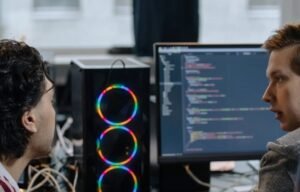Will AI Replace Software Engineers in the Future?
Introduction
Artificial Intelligence (AI) has been making significant strides in various industries, raising questions
about the future of many professions. Software engineering, being a field that heavily relies on coding and
problem-solving, is not immune to the impact of AI. This article aims to explore whether AI will eventually
replace software engineers and what implications it may have on the industry.
Key Takeaways
- AI technology is rapidly advancing and becoming more capable.
- Software engineers need to adapt and embrace AI as a complementary tool.
- Human creativity and critical thinking remain essential in software engineering.
The Current Role of AI in Software Engineering
At present, AI is primarily assisting software engineers rather than replacing them. AI-powered tools
can analyze large datasets and produce code snippets, helping engineers automate repetitive tasks and
improve efficiency. *However, these tools still require human oversight and decision-making* to ensure
the software meets the desired requirements and solves complex problems.
The Limitations of AI in Software Engineering
While AI has shown great potential in certain areas, it has limitations when it comes to software
engineering. *AI lacks human intuition and comprehensive understanding of user needs*, making it
challenging to design intuitive user interfaces and incorporate empathy into software. Additionally,
AI may struggle with ambiguous or novel problems that require creative solutions, where human
expertise and experience are pivotal.
The Future Prospects of AI and Software Engineering
Looking ahead, AI will likely continue to transform software engineering. Software engineers may
increasingly rely on AI tools and frameworks to accelerate development and automate routine tasks.
However, it is important to recognize that *AI will not replace the need for skilled human software
engineers*. Instead, the role may shift towards leveraging AI as a powerful companion in design,
testing, and optimization processes.
Data Points on AI and Software Engineering
| Year | AI-related Job Postings |
|---|---|
| 2015 | 30,863 |
| 2020 | 123,279 |
| Source: Indeed.com | |
| Benefits of AI in Software Engineering |
|---|
| Better code quality and bug detection |
| Improved software testing and verification |
| Enhanced productivity and efficiency |
| Factors That AI Struggles With |
|---|
| Designing intuitive user interfaces |
| Solving ambiguous and novel problems |
| Incorporating empathy and human touch in software |
Embracing the Future Together
In conclusion, while AI is transforming the field of software engineering, it is unlikely to replace
human software engineers entirely. The key lies in embracing AI as a powerful tool and working in
harmony with it. By leveraging AI’s capabilities, software engineers can focus on higher-level problem
solving, creative design, and providing valuable insights that drive innovation. The future is one of
collaboration between AI and human expertise, allowing us to create software solutions that empower
and enrich our lives.

Common Misconceptions
1. AI will completely replace software engineers
One common misconception is that artificial intelligence (AI) will completely replace software engineers in the future. While AI has the potential to automate certain aspects of software development, it is unlikely to eliminate the need for human engineers altogether.
- AI can automate repetitive tasks and assist with code generation, but it cannot replace the creative problem-solving abilities of human engineers.
- Software engineering involves more than just writing code. It requires skills such as communication, collaboration, and understanding of complex business requirements, which AI may struggle to replicate.
- Software engineers are constantly adapting and learning new technologies. They play a crucial role in designing, testing, and maintaining software systems, tasks that may not be easily automated by AI.
2. AI will make software engineering irrelevant
Another misconception is that AI will make software engineering as a profession irrelevant. However, the demand for skilled software engineers is expected to remain high, even with advancements in AI technology.
- AI may enhance certain aspects of software engineering, such as automated testing or bug detection, but it cannot replace the need for human expertise in designing complex algorithms and applications.
- Software engineering is a rapidly evolving field, and engineers are instrumental in pushing the boundaries of what is possible with technology. AI is just another tool in the software engineer’s toolkit.
- Software engineering also involves understanding user needs, creating user-friendly interfaces, and ensuring the software meets quality standards. These are areas where human intuition and creativity are still highly valuable.
3. AI will lead to widespread unemployment among software engineers
There is a misconception that advancements in AI will lead to widespread unemployment among software engineers. While AI may impact certain job roles or change the nature of work, it is unlikely to cause mass unemployment in the field.
- As AI technology evolves, new job roles and opportunities are likely to emerge. Software engineers can adapt and upskill to work alongside AI systems or specialize in areas that require human creativity and problem-solving abilities.
- While some routine tasks may be automated with AI, the need for humans to oversee, maintain, and improve AI systems will continue to exist.
- Software engineering is a broad field, and although some job roles may be affected by AI advancements, there will still be a demand for specialized engineers who can design, develop, and optimize AI technology.
4. AI can replace software engineering education
One misconception is that AI can replace the need for formal education in software engineering. However, obtaining a solid education in software engineering remains crucial for a successful career in the field.
- While AI can assist in certain aspects of learning, such as providing recommendations or aiding in code completion, it cannot replace the depth of knowledge and analytical skills acquired through structured learning programs.
- Software engineering education goes beyond coding and involves learning fundamental principles, problem-solving strategies, and best practices that shape an engineer’s thinking and approach to software development.
- Hands-on experience gained through projects, internships, and collaborative work is crucial in software engineering education to develop practical skills that go beyond what AI can provide.
5. AI and software engineers are in direct competition
Another misconception is that AI and software engineers are in direct competition with each other. In reality, AI and software engineers can complement each other’s capabilities and work collaboratively.
- AI systems can assist software engineers by automating repetitive tasks, improving code quality through static analysis, or providing insights and recommendations for optimization.
- Software engineers are essential for designing, building, and maintaining AI systems. They contribute by selecting appropriate algorithms, training and fine-tuning models, and ensuring ethical considerations are addressed.
- Collaboration between AI and software engineers allows for the development of more advanced and intelligent software applications that can solve complex problems and deliver innovative solutions.

Introduction
In recent years, the rapid advancements in Artificial Intelligence (AI) have led to speculation about the potential future of various professions. One such profession that has generated much discussion is that of software engineering. Will AI eventually replace software engineers? In this article, we will explore this question and present some interesting data and points to consider.
Table 1: Comparison of Software Engineers and AI
Below is a comparison of software engineers and AI in terms of various factors:
| Factors | Software Engineers | AI |
|——————-|—————————-|——————-|
| Creativity | Possess creative thinking | Can generate ideas |
| Learning ability | Continuously learn | Can learn faster |
| Emotional aspect | Express emotions | Lacks emotions |
| Logical thinking | Apply logic in problem-solving | Built on logical algorithms |
| Adaptability | Can adapt to new technologies | Can adapt and self-improve |
| Human interaction | Collaborate with stakeholders | Lacks human interaction skills |
Table 2: AI’s Impact on Software Engineering
Let’s explore how AI is already making an impact on the field of software engineering:
| Impact areas | Examples of AI in Software Engineering |
|——————-|—————————————————————————————|
| Debugging | AI-powered debugging tools that identify and fix software bugs |
| Automation | AI automating repetitive tasks, improving efficiency |
| Code generation | AI algorithms capable of generating code based on high-level instructions |
| Testing | AI-powered testing frameworks that autonomously test software |
| Project analysis | AI systems that analyze project data to provide insights and recommendations |
| Quality assurance | AI algorithms that assess code quality and identify potential issues |
Table 3: AI vs. Software Engineers in Salary
Let’s compare the average salaries of AI professionals and software engineers:
| Profession | Average Annual Salary ($) |
|——————-|—————————|
| Software Engineer | 100,000 |
| AI Professional | 150,000 |
Table 4: AI Adoption by Companies
A glimpse into how companies are embracing AI technologies:
| Industry | Percentage of Companies Integrating AI |
|——————|—————————————-|
| Healthcare | 72% |
| Finance | 68% |
| Manufacturing | 56% |
| Advertising | 48% |
| Retail | 42% |
Table 5: Jobs at Risk
Jobs that may face the risk of being replaced by AI:
| Professions | Percentage at Risk |
|————————-|——————–|
| Data entry clerks | 99% |
| Telemarketers | 98% |
| Loan officers | 86% |
| Call center operators | 78% |
| Insurance underwriters | 67% |
Table 6: Skills for Future Software Engineers
The skills that software engineers should focus on for a successful future:
| Skills | Description |
|—————————-|————————————————————————————–|
| Machine learning | Understanding and applying ML algorithms in software development |
| Cybersecurity | Expertise in securing software and protecting against cyber threats |
| Cloud computing | Proficiency in utilizing cloud platforms for efficient and scalable software systems |
| Human-computer interaction | Knowledge of designing user-friendly and intuitive software interfaces |
Table 7: Survey on AI Replacing Software Engineers
Results from a survey conducted on the possibility of AI replacing software engineers:
| Survey Questions | Percentage Agreeing |
|———————————————-|———————|
| AI will eventually replace software engineers | 42% |
| AI will augment, not replace, software engineers | 58% |
Table 8: AI Specializations
Specializations within AI that provide career opportunities:
| Specializations | Description |
|—————–|———————————————————————————————|
| Natural Language Processing (NLP) | Focusing on understanding and processing human language using AI techniques |
| Computer Vision | Developing algorithms for analyzing and interpreting visual information using AI |
| Robotics | Building intelligent robotic systems capable of performing tasks in various environments |
Table 9: AI Research Funding
Funding allocated to AI research and development:
| Country | Annual AI Research Funding (in billions) |
|—————|—————————————–|
| United States | 10 |
| China | 8 |
| European Union| 6 |
| Japan | 4 |
| South Korea | 2 |
Table 10: AI-Driven Innovations in Software Engineering
Examples of innovations driven by AI in the realm of software engineering:
| Innovations | Description |
|—————————–|——————————————————————————|
| Automatic code refactoring | AI algorithms that optimize and improve existing software codebases |
| Predictive analytics | AI tools that analyze past software performance data to predict future issues |
| Intelligent code completion | AI-powered code editors that offer suggestions based on context and patterns |
| Bug prediction | AI models that identify potential software bugs before they occur |
Conclusion
The rise of AI undoubtedly poses challenges and opportunities for software engineers. While AI is taking over certain tasks and roles, it’s important to remember that software engineers possess unique creative and human-centric skills that AI still lacks. Collaboration between AI and software engineers will likely be the key to achieving groundbreaking innovations in the future.
Frequently Asked Questions
Will AI take over the role of software engineers?
While AI has the potential to automate certain aspects of software engineering, it is unlikely to completely replace software engineers. Software engineering requires a combination of technical knowledge, problem-solving skills, and creativity, which currently human engineers excel at.
What role can AI play in software development?
AI can assist software engineers in various ways, such as automating repetitive tasks, generating code snippets, and improving software quality through automated testing and bug detection. It can augment the capabilities of software engineers, leading to increased productivity and efficiency.
Can AI write code?
AI can generate code using techniques such as automated code generation, machine learning, and natural language processing. However, the complexity and creativity required in software development make it challenging for AI to write entire programs or replace the need for human intervention.
Will AI impact the job market for software engineers?
AI has the potential to reshape the job market for software engineers. While some routine tasks may be automated, AI also creates new job opportunities in areas such as AI development, data analysis, and system optimization. Adaptability and continuous learning will be crucial for software engineers to thrive in this evolving landscape.
Will AI be able to understand user requirements and design solutions?
AI has made significant progress in understanding and extracting user requirements through techniques like natural language processing and sentiment analysis. However, designing effective solutions requires human expertise, critical thinking, and a deep understanding of user needs, which currently cannot be replicated by AI.
Can AI improve software development productivity and efficiency?
Yes, AI can enhance productivity and efficiency in software development. AI-powered tools can automate repetitive tasks, provide intelligent code suggestions, perform automated testing, and help manage large codebases. This allows software engineers to focus more on complex problems and higher-level tasks, ultimately improving overall productivity.
What skills are important for software engineers to remain relevant in the AI era?
Software engineers need to adapt and upskill to thrive in the AI era. Skills such as machine learning, data analysis, and AI development will become increasingly valuable. Additionally, soft skills like problem-solving, critical thinking, and collaboration will continue to be essential for success in this technology-driven industry.
Will AI replace software engineers in all industries?
The impact of AI on the role of software engineers will vary across industries. While certain industries may experience more automation and AI-driven solutions, there will always be a need for human software engineers to design, develop, and maintain complex systems that require domain-specific knowledge and expertise.
What ethical considerations should be made when using AI in software development?
When integrating AI into software development, it is important to consider ethical aspects such as data privacy, algorithmic biases, transparency, and the potential impact on employment. Ensuring fairness, accountability, and transparency in AI applications should be prioritized to avoid perpetuating inequality or creating harmful consequences.
How can software engineers collaborate with AI technologies?
Software engineers can collaborate with AI technologies by embracing AI-powered tools for code suggestion, debugging, testing, and optimization. They can also contribute to the development of AI algorithms, ensuring they align with human needs, ethical principles, and domain-specific requirements. Software engineers play a crucial role in guiding and leveraging the potential of AI in software development.





